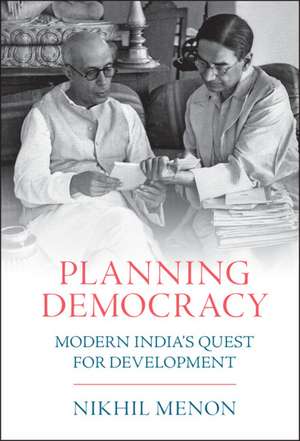Planning Democracy: Modern India's Quest for Development
Autor Nikhil Menonen Limba Engleză Hardback – 30 mar 2022
| Toate formatele și edițiile | Preț | Express |
|---|---|---|
| Paperback (1) | 237.74 lei 6-8 săpt. | |
| Cambridge University Press – 30 mar 2022 | 237.74 lei 6-8 săpt. | |
| Hardback (1) | 583.91 lei 6-8 săpt. | |
| Cambridge University Press – 30 mar 2022 | 583.91 lei 6-8 săpt. |
Preț: 583.91 lei
Preț vechi: 656.07 lei
-11% Nou
Puncte Express: 876
Preț estimativ în valută:
111.73€ • 119.48$ • 93.16£
111.73€ • 119.48$ • 93.16£
Carte tipărită la comandă
Livrare economică 18 aprilie-02 mai
Preluare comenzi: 021 569.72.76
Specificații
ISBN-13: 9781316517338
ISBN-10: 1316517330
Pagini: 285
Dimensiuni: 154 x 235 x 15 mm
Greutate: 0.56 kg
Ediția:Nouă
Editura: Cambridge University Press
Colecția Cambridge University Press
Locul publicării:Cambridge, United Kingdom
ISBN-10: 1316517330
Pagini: 285
Dimensiuni: 154 x 235 x 15 mm
Greutate: 0.56 kg
Ediția:Nouă
Editura: Cambridge University Press
Colecția Cambridge University Press
Locul publicării:Cambridge, United Kingdom
Cuprins
List of Figures; Acknowledgements; Introduction; Part I. Data: 1. A Nation in Numbers; 2. Calcutta Conquers Delhi; 3. Chasing Computers; Part II. Democracy?: 4. Help the Plan—Help Yourself; 5. Salvation in Service; Epilogue; Notes; Select Bibliography; Index.
Recenzii
'Written with wit and energy, impeccably well researched, Planning Democracy makes a bold new contribution to our understanding of the Indian state after 1947. Menon's is the best history we have of India's great experiment with statistics: a data-driven attack on social and economic inequality that aimed, not always successfully, to be compatible with participatory democracy. Menon combines intellectual and institutional history to make a compelling case that we should focus less on whether planning “succeeded” or “failed,” in any narrow sense, and more on the profound ways it shaped India's political imagination. This excellent book is sure to find a wide and appreciative audience across disciplines.' Sunil Amrith, Yale University
'Through richly researched analysis, Menon skilfully brings to life the multi-dimensional world of planning in early independent India. Exploring how planning – as process and as political imaginary – has reshaped state and society this book offers critical historical insight into events and debates that continue to shape our world today.' Eleanor Newbigin, SOAS
'Full of telling details, quirky anecdotes, interesting dramatis personae, and set against a fraught geopolitical background, Planning Democracy makes India's quixotic experiment with “democratic planning” come truly alive. Through this story, Menon provides a smart and clear-eyed analysis of the ambitions and failures of the Nehruvian state.' Mrinalini Sinha, University of Michigan
'This book provides a well-written and fresh perspective on centralized economic planning in post-independence India. Past studies have primarily focused on the economic impact of planning. Menon's richly detailed study instead explores an important set of political and institutional questions raised by this approach: How did planning in India seek to blend seemingly contradictory Soviet-inspired ideas of economic planning with commitments to liberal democratic institutions and increasing citizen participation in politics? How did the quotidian implementation of planning expand the state's footprint in ways that endure beyond any individual government or ideological era? And how were the language and ideas behind planning infused within Indian society, shaping everything from political life to popular culture? Menon's compelling answers are worth reading for anyone interested in contemporary India, especially at a time of renewed debate and concern regarding the degree of centralization in India's political and economic institutions.' Tariq Thachil, University of Pennsylvania
'Through richly researched analysis, Menon skilfully brings to life the multi-dimensional world of planning in early independent India. Exploring how planning – as process and as political imaginary – has reshaped state and society this book offers critical historical insight into events and debates that continue to shape our world today.' Eleanor Newbigin, SOAS
'Full of telling details, quirky anecdotes, interesting dramatis personae, and set against a fraught geopolitical background, Planning Democracy makes India's quixotic experiment with “democratic planning” come truly alive. Through this story, Menon provides a smart and clear-eyed analysis of the ambitions and failures of the Nehruvian state.' Mrinalini Sinha, University of Michigan
'This book provides a well-written and fresh perspective on centralized economic planning in post-independence India. Past studies have primarily focused on the economic impact of planning. Menon's richly detailed study instead explores an important set of political and institutional questions raised by this approach: How did planning in India seek to blend seemingly contradictory Soviet-inspired ideas of economic planning with commitments to liberal democratic institutions and increasing citizen participation in politics? How did the quotidian implementation of planning expand the state's footprint in ways that endure beyond any individual government or ideological era? And how were the language and ideas behind planning infused within Indian society, shaping everything from political life to popular culture? Menon's compelling answers are worth reading for anyone interested in contemporary India, especially at a time of renewed debate and concern regarding the degree of centralization in India's political and economic institutions.' Tariq Thachil, University of Pennsylvania
Notă biografică
Descriere
An innovative history exploring independent India's experiment fusing Soviet-inspired economic management with Western-style liberal democracy.
